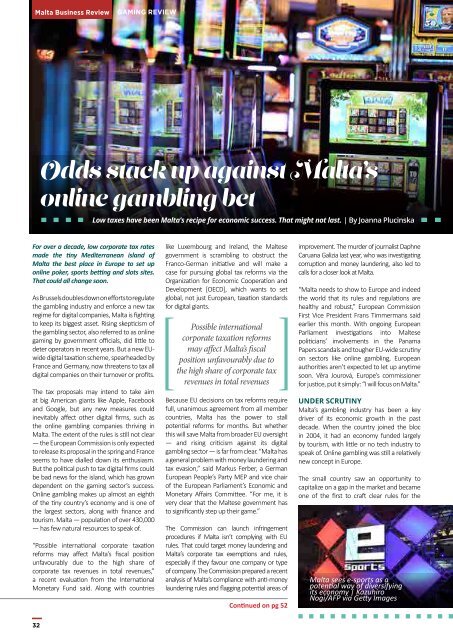MBR_ISSUE 41_Cover_LOW
You also want an ePaper? Increase the reach of your titles
YUMPU automatically turns print PDFs into web optimized ePapers that Google loves.
Malta Business Review<br />
GAMING REVIEW<br />
Odds stack up against Malta’s<br />
online gambling bet<br />
Low taxes have been Malta’s recipe for economic success. That might not last. | By Joanna Plucinska<br />
For over a decade, low corporate tax rates<br />
made the tiny Mediterranean island of<br />
Malta the best place in Europe to set up<br />
online poker, sports betting and slots sites.<br />
That could all change soon.<br />
As Brussels doubles down on efforts to regulate<br />
the gambling industry and enforce a new tax<br />
regime for digital companies, Malta is fighting<br />
to keep its biggest asset. Rising skepticism of<br />
the gambling sector, also referred to as online<br />
gaming by government officials, did little to<br />
deter operators in recent years. But a new EUwide<br />
digital taxation scheme, spearheaded by<br />
France and Germany, now threatens to tax all<br />
digital companies on their turnover or profits.<br />
The tax proposals may intend to take aim<br />
at big American giants like Apple, Facebook<br />
and Google, but any new measures could<br />
inevitably affect other digital firms, such as<br />
the online gambling companies thriving in<br />
Malta. The extent of the rules is still not clear<br />
— the European Commission is only expected<br />
to release its proposal in the spring and France<br />
seems to have dialled down its enthusiasm.<br />
But the political push to tax digital firms could<br />
be bad news for the island, which has grown<br />
dependent on the gaming sector’s success.<br />
Online gambling makes up almost an eighth<br />
of the tiny country’s economy and is one of<br />
the largest sectors, along with finance and<br />
tourism. Malta — population of over 430,000<br />
— has few natural resources to speak of.<br />
“Possible international corporate taxation<br />
reforms may affect Malta’s fiscal position<br />
unfavourably due to the high share of<br />
corporate tax revenues in total revenues,”<br />
a recent evaluation from the International<br />
Monetary Fund said. Along with countries<br />
like Luxembourg and Ireland, the Maltese<br />
government is scrambling to obstruct the<br />
Franco-German initiative and will make a<br />
case for pursuing global tax reforms via the<br />
Organization for Economic Cooperation and<br />
Development [OECD], which wants to set<br />
global, not just European, taxation standards<br />
for digital giants.<br />
Possible international<br />
corporate taxation reforms<br />
may affect Malta’s fiscal<br />
position unfavourably due to<br />
the high share of corporate tax<br />
revenues in total revenues<br />
Because EU decisions on tax reforms require<br />
full, unanimous agreement from all member<br />
countries, Malta has the power to stall<br />
potential reforms for months. But whether<br />
this will save Malta from broader EU oversight<br />
— and rising criticism against its digital<br />
gambling sector — is far from clear. “Malta has<br />
a general problem with money laundering and<br />
tax evasion,” said Markus Ferber, a German<br />
European People’s Party MEP and vice chair<br />
of the European Parliament’s Economic and<br />
Monetary Affairs Committee. “For me, it is<br />
very clear that the Maltese government has<br />
to significantly step up their game.”<br />
The Commission can launch infringement<br />
procedures if Malta isn’t complying with EU<br />
rules. That could target money laundering and<br />
Malta’s corporate tax exemptions and rules,<br />
especially if they favour one company or type<br />
of company. The Commission prepared a recent<br />
analysis of Malta’s compliance with anti-money<br />
laundering rules and flagging potential areas of<br />
Continued on pg 52<br />
improvement. The murder of journalist Daphne<br />
Caruana Galizia last year, who was investigating<br />
corruption and money laundering, also led to<br />
calls for a closer look at Malta.<br />
“Malta needs to show to Europe and indeed<br />
the world that its rules and regulations are<br />
healthy and robust,” European Commission<br />
First Vice President Frans Timmermans said<br />
earlier this month. With ongoing European<br />
Parliament investigations into Maltese<br />
politicians’ involvements in the Panama<br />
Papers scandals and tougher EU-wide scrutiny<br />
on sectors like online gambling, European<br />
authorities aren’t expected to let up anytime<br />
soon. Věra Jourová, Europe’s commissioner<br />
for justice, put it simply: “I will focus on Malta.”<br />
UNDER SCRUTINY<br />
Malta’s gambling industry has been a key<br />
driver of its economic growth in the past<br />
decade. When the country joined the bloc<br />
in 2004, it had an economy funded largely<br />
by tourism, with little or no tech industry to<br />
speak of. Online gambling was still a relatively<br />
new concept in Europe.<br />
The small country saw an opportunity to<br />
capitalize on a gap in the market and became<br />
one of the first to craft clear rules for the<br />
Malta sees e-sports as a<br />
potential way of diversifying<br />
its economy | Kazuhiro<br />
Nogi/AFP via Getty Images<br />
32

















